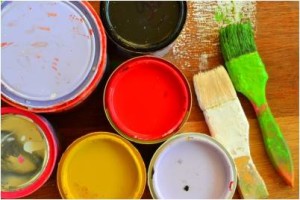 Image courtesy of geww / FreeDigitalPhotos.net
Image courtesy of geww / FreeDigitalPhotos.net
Paint comes in all shades and tones, but the most important color, for the health and safety of your family, is green. Not green as in lime twist or garden sprout, but the eco-friendly type of green. Nontoxic paint varieties do away with harmful chemicals, while offering up the color your home seeks.
What makes nontoxic paint different boils down to the ingredients. Nontoxic paint can also be labeled low or no-VOC paint. VOC stands for volatile organic compounds. If you have ever use paint, think of the intoxicating smells that fill the room as soon as you open a fresh can of paint. Those are the VOCs. They flow from certain solids and liquids, in this case paint. As paint dries, the hazardous chemicals leech into your indoor air, degrading your home’s air quality. The EPA has found that your indoor levels of organic chemicals can be two to five times higher than the levels outdoors. [1] These raised levels of VOCs have been linked to chronic and acute health issues, including some VOCs that are classified as carcinogens. In the short-term, acute symptoms include headaches and skin rashes. Long-term symptoms include heart, lung and kidney damage. So, it makes sense that you would want to seek out nontoxic paint for your home. No paint color is pretty enough to risk your family’s health on.
The good news is that there are tons of safe, nontoxic paint options on the market with an ever-expanding color palette. Through EPA certification, paint companies can earn a low-VOC rating, which means it will have around 100 grams per liter or less. You can even go a step further and select a no-VOC paint. Companies produce the nontoxic paint by using natural based ingredients, such as milk and minerals.
While it typically costs a little more than the unhealthier paint, it isn’t hard to find. Shop at any Home Depot or Lowe’s and you will find eco-friendly paint. Familiar names, such as Benjamin Moore, Olympia and Valspar, offer low- and no-VOC paints. But you will also see names like YOLO Colorhouse, which specializes in water-based paint, and Glidden on the same shelves at the home store.
You may be wondering if these more natural paints cover and last as well as higher-VOC paints. The longevity of the paint is reduced only slightly. It’s the coverage that will you will notice first. It may take an addition coat with the low- or no-VOC paint.
So don’t let dangerous chemicals prevent you from coloring your home with paint. Add personal touches to your home by using nontoxic paint, keeping your family healthy and your walls safe.
Author: Brenna Malmberg [1] EPA indoor to outdoor chemical levelsTags
Subscribe to NV Roofing's Blog



